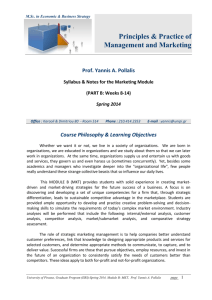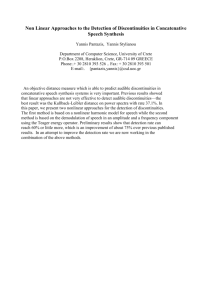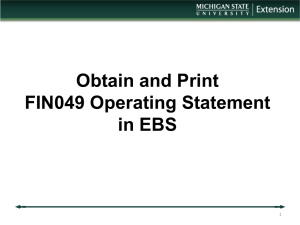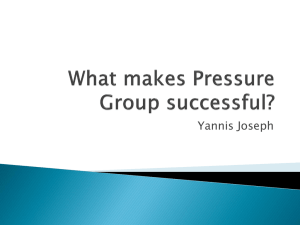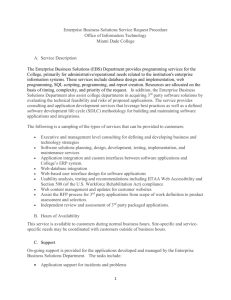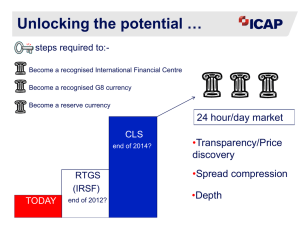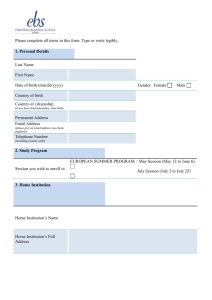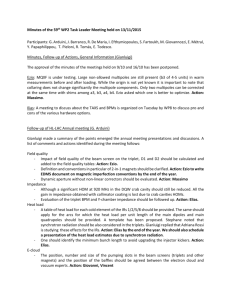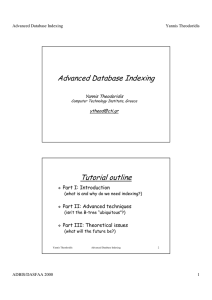Course Syllabus
advertisement
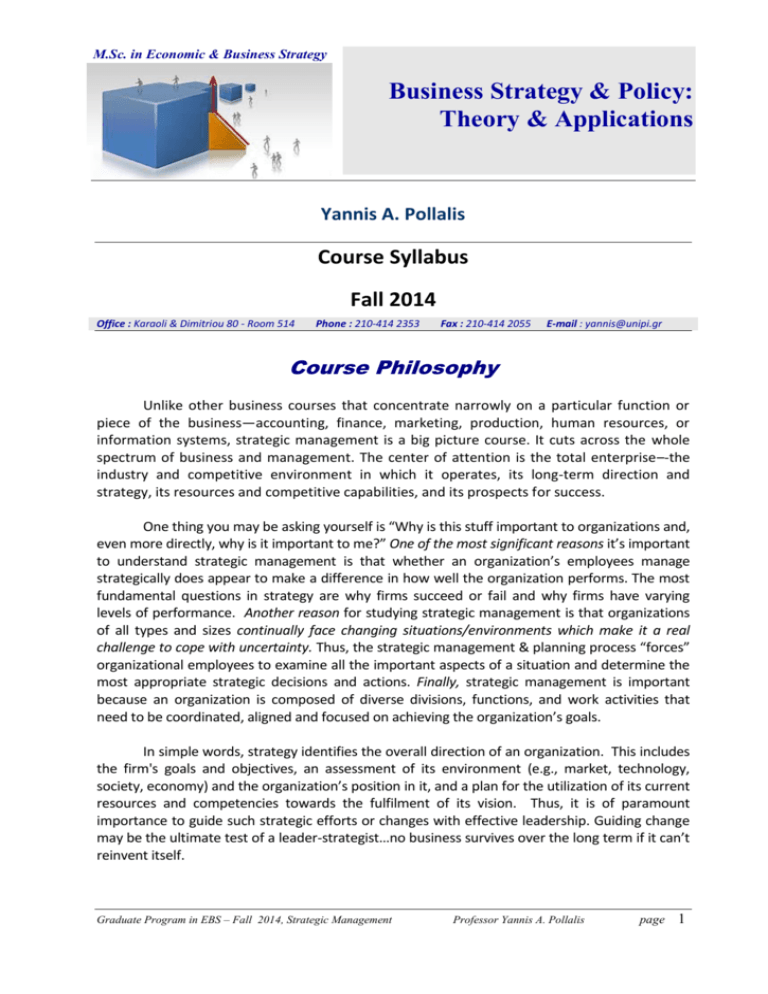
M.Sc. in Economic & Business Strategy Business Strategy & Policy: Theory & Applications Yannis A. Pollalis Course Syllabus Fall 2014 Office : Karaoli & Dimitriou 80 - Room 514 Phone : 210-414 2353 Fax : 210-414 2055 E-mail : yannis@unipi.gr Course Philosophy Unlike other business courses that concentrate narrowly on a particular function or piece of the business—accounting, finance, marketing, production, human resources, or information systems, strategic management is a big picture course. It cuts across the whole spectrum of business and management. The center of attention is the total enterprise–-the industry and competitive environment in which it operates, its long-term direction and strategy, its resources and competitive capabilities, and its prospects for success. One thing you may be asking yourself is “Why is this stuff important to organizations and, even more directly, why is it important to me?” One of the most significant reasons it’s important to understand strategic management is that whether an organization’s employees manage strategically does appear to make a difference in how well the organization performs. The most fundamental questions in strategy are why firms succeed or fail and why firms have varying levels of performance. Another reason for studying strategic management is that organizations of all types and sizes continually face changing situations/environments which make it a real challenge to cope with uncertainty. Thus, the strategic management & planning process “forces” organizational employees to examine all the important aspects of a situation and determine the most appropriate strategic decisions and actions. Finally, strategic management is important because an organization is composed of diverse divisions, functions, and work activities that need to be coordinated, aligned and focused on achieving the organization’s goals. In simple words, strategy identifies the overall direction of an organization. This includes the firm's goals and objectives, an assessment of its environment (e.g., market, technology, society, economy) and the organization’s position in it, and a plan for the utilization of its current resources and competencies towards the fulfilment of its vision. Thus, it is of paramount importance to guide such strategic efforts or changes with effective leadership. Guiding change may be the ultimate test of a leader-strategist…no business survives over the long term if it can’t reinvent itself. Graduate Program in EBS – Fall 2014, Strategic Management Professor Yannis A. Pollalis page 1 Course Learning Objectives 1. To develop strategic thinking by learning the concepts, models and tools of strategy analysis and applying them to actual competitive situations. 2. To develop your capacity to think strategically about a company, its business position, how it can gain a sustainable competitive advantage, and how its strategy can be implemented and executed successfully using various resources. 3. To build your skills in conducting strategic analysis in a variety of industries and competitive situations and to provide you with a stronger understanding of the competitive challenges of the global market environment, as well as of the e-business environment. 4. To provide a thorough understanding of the strategic planning for organizational resources process, tools and methodologies, and finally 5. To provide a realistic experience in crafting corporate resources strategy, reasoning carefully about strategic options, using what-if analysis (via a business simulation game) to evaluate action alternatives, and making sound strategic decisions. Recommended Texts & Readings Σχεδιασμός & Υλοποίηση Επιχειρησιακής Στρατηγικής: Η Αναζήτηση Ανταγωνιστικού Πλεονεκτήματος, Thompson, Strickland & Gable – Επιμέλεια: Γιάννης Α. Πολλάλης, Εκδόσεις UTOPIA, Αθήνα 2010 (ISBN: 978-960-98123-2-0). Additional Articles, Readings, Cases and Videos will be used in class as vehicles for discussion (the final selection will be distributed at the beginning of class). Teaching Philosophy “Tell me, and I will listen. Show me, and I will understand. Involve me, and I will learn.” (Old Indian Saying) In class, I will act as a lecturer, moderator and facilitator to help you gain a better understanding of the various organizational and marketing processes, tools and strategic situations. By actively participating in class discussions and experiential exercises, you will sharpen your own insights and those of your classmates, make your work engaging and stimulating and ensure that these experiences will equip you with the tools needed to further your knowledge and career plans in business. Based on extensive discussions on the practices of strategy and change management and the definitions involved in current literature, as well as the use of case studies and the exposure to real world situations via a field project and a business computer-based simulation, students will be able to (a) understand the importance of strategy and planning for modern organizations, (b) learn the what, who, how, and why's of the strategy process, (c) understand the challenges and advantages created by Change Mgt. principles and methods, and (d) become familiar with the major deliverables of the strategy process. Graduate Program in EBS – Fall 2014, Strategic Management Professor Yannis A. Pollalis page 2 Class Projects & Assignments The course will include assignments and group presentations. All assignments (case analyses and presentation, essays, group exercises, etc.) will be provided at the beginning of the class and will be due within the time period the class is taking place (except the final project which will be due a few days after the class is over). Each day of class will have 2 different sessions. The first session (18.00 – 19:15) will include lectures and coverage of class material while the later session (19:45 – 21:00) will consist of cases, in-class exercises, discussions on videos and possible presentations. The final grading scheme based on the projects available will be announced at the beginning of class. Grading Policy I. Attendance, Class Assignments & Participation (Individual) II. Final Class Project & Presentation (Group) and/or Exams 50% 50% Recommended (Additional) Class Resources (Optional references to complement class material and learning) 1. Strategic Management: Concepts & Cases, by Fred R. David, 10th edition, Prentice- Hall, New Jersey, 2005 (www.prenhall.com/david and www.strategyclub.com) 2. Strategic Management: Text and Cases on Competitiveness and Globalization, by Michael Hitt and Duane Ireland, West Publishing, Boston, 2004. 3. Exploring Corporate Strategy: Text & Cases, by Johnson G., Scholes, K. and Whittington, R., 7th edition, Prentice-Hall/Financial Times, London, UK, 2005. Pollalis, Y.A. & Vozikis, A. (2013) “Strategies for Mergers & Acquisitions in the Greek Private Healthcare Sector: The Case of IASO General Hospital”, Journal of Marketing & Operations Management Research, Vol.2, No.1, Nova Science, UK. 4. 5. F.W.Gluck, S. Kaufman and A.S. Walleck, “The Four Phases of Strategic Management”, Journal of Business Strategy, Winter 1982. 6. T.J. Andersen, “Strategic Planning, Autonomous Actions and Corporate Performance”, Long-Range Planning, April 2000. Pollalis, Yannis A. and Grant, John H., “Information Resources & Corporate Strategy Development”, Information Strategy, Vol.11, No.1, pp. 12-28, Fall 1994. 7. 8. Henry Mintzberg, “Strategy Making in Three Modes”, California Management Review, Winter 1973. 9. Pollalis, Yannis A., “Patterns of Co-Alignment in Information-Intensive Organizations: Business Performance through Integration Strategies”, International Journal of Information Graduate Program in EBS – Fall 2014, Strategic Management Professor Yannis A. Pollalis page 3 Management, Vol.23, No.6, pp. 469-492, December 2003. (Included in ScienceDirect’s TOP25 Articles for Decision Sciences for 2003-2006) 10. Pollalis, Y.A. & Dimitriou, N.K., “Strategic Management of Knowledge in Virtual Enterprises: A Systemic Multi-methodology toward Competitive Advantage”, International Journal of Information Management, forthcoming in 2009. 11. Pollalis, Y.A. & Mavrommatis, G., “Using Similarity Measures in Collaborating Groups: Towards the Formation of Most Valuable Distance Learning Environments”, European Journal of Operational Research, forthcoming in 2009. Pollalis, Y.A. & Macris, A., “Strategic Planning for Information Resources: Enhancing Users’ Participation through Ontology-based Modeling”, International Journal of Technology Management, forthcoming in 2009. 12. 13. Pollalis, Yannis A. and Koliousis, I., “An Enterprise Performance Measurement System: Using the Balanced Scorecard for Business Improvement”, Journal of Applied Systems Studies (2004). 14. Pollalis, Yannis A., Gartenberg, Marc and Edmunds, Barbara., “Applying the Balanced Scorecard Methodology in the Public Sector: The Case of the Department of Defense in the United States”, Journal of Economics & Business (SPOUDAI) (2004). Πολλάλης Γιάννης & Βοζίκης Αθανάσιος, «Στρατηγικός Σχεδιασμός Συστημάτων Υγείας: Διαχείριση της Ζήτησης Υπηρεσιών Πρωτοβάθμιας Περίθαλψης στην Ελλάδα», Δελτίον Διοικήσεως Επιχειρήσεων, Vol. 44, Issue 358, May-June 2006. 15. Pollalis, Yannis, “Sustainable Competitive Advantage in Turbulent Environments: An Integrative Model of the Industrial Economics and the Resource-based Theories in Strategic Management”, Journal of Economics & Business (SPOUDAI), Vol.55, No.4, 2005. 16. 17. The Financial Times Guide to Strategy: How to Create & Deliver a Useful Strategy, by Richard Koch, 2nd edition, Prentice-Hall/FT, London, 2000 (www.business-minds.com ). 18. Beer, M. and Nohria, N.”Cracking the code of change”, Harvard Business Review, May-June 2000. 19. Batzias, F., L. Kamarinopoulos, Y.A. Pollalis, A. Kanas (2012) «Suggesting a New Scheme of 2nd Order Cybernetics to Integrate the principle ‘Think Globally-Act Locally’ for Maximizing Environmental Sustainability», Proceedings of the 5th (WSEAS) International Conference on Environmental and Geological Science and Engineering, Vienna, Austria, November 10-12. 20. Business Planning Tools and sample Business Plans and articles: www.bplans.com 21. Center for Business Planning, sample business plans and methods, www.businessplans.org/businessplans.html 22. Kotter, J.“Leading Change: Why transformation efforts fail”, Harvard Business Review, January 2007. 23. Sirkin, H., Keenan, P. and Jackson A.“The hard side of change management”, Harvard Business Review, Oct. 2005. 24. Pollalis, Y.A., C. Siontorou & Batzias, D.F. (2011) "Strategic networking of environmental sensors for early warning in case of extreme pollution episodes calling for emergent state intervention", 9th International Conference of Computational Methods in Sciences and Engineering, 2-7 October, Halkidiki, Greece. Graduate Program in EBS – Fall 2014, Strategic Management Professor Yannis A. Pollalis page 4 Class Mechanics & Descriptive Schedule Week 1 : Overview of Strategy Introduction to strategy and strategic management Origins of Strategy Strategy in different contexts: Military vs. Business Strategy as part of Leadership: Role of Vision in Success Why is Strategy Important? Week 2: Charting a company’s direction, vision & objectives Developing and Communicating a Strategic Vision Setting Objectives Crafting a Strategy Vision + Objectives + Strategy = Strategic Plan… Assignment & Case Study Week 3: Environmental Scanning Analysis of the macro-environment: How and Why? PESTEL model vs.Porter’s 5 Forces vs. SWOT analysis Strategic Groups: Clustering Strategic Characteristics Critical Success Factors (CSFs) methodology Competitive Pressures Associated with the Five Forces: Why do we need to know them? Week 4: Strategic Capability & Competitive Advantage Resources and Competencies Sustainable competitive advantage: How? Value Chain and Value Network Benchmarking Strategies Case Study Assignment Week 5: The Five Generic Competitive Strategies Low-Cost Provider Strategies Broad Differentiation Strategies Focused (or Market Niche) Strategies Hybrid Strategies Week 6: Strategy Development Methods Directions of strategy development: internal & external Mergers and acquisitions Strategic alliances and success criteria Strategic planning systems and implementation problems Assignment & Case Study Graduate Program in EBS – Fall 2014, Strategic Management Professor Yannis A. Pollalis page 5 Week 7: Business & Corporate Level Strategies Strategic Business Units (SBUs) and the ‘strategy clock’ Sustaining competitive advantage: Business level strategies Collaboration, co-opetition and synergies Corporate level strategies: diversification and international strategies Week 8: Corporate Governance & Change Management Executive Seminar (Guest Speaker): Industry Applications on Strategy Corporate governance and relationships with customers Stakeholder expectations and mapping approaches Need for Change Management – Why now? Corporate values, mission and objectives: Tools for Successful Change Mgt? Week 9: Strategic Change & Knowledge Management Executive Seminar (Guest Speaker): Industry Applications on Strategy Diagnosing the Change situation Types of strategic change and roles in managing change Machiavelli’s concepts for change management & leadership Communicating and monitoring change processes Assignment & Case Study Week 10: Practical Impacts of Change Management Executive Seminar (Guest Speaker): Industry Applications on Strategy Reasons for success and failure of change efforts Role of culture in effective change management Change and its impact on productivity and overall success Week 11: Strategy Implementation & Control - Measuring Organizational Performance Who implements strategy and what does it mean? Developing programs of action, budgets and procedures Methods for measuring performance ABC (Activity-based costing) BBS (Balanced scorecard: evolution, method and applications) Case Analysis & Discussion Week 12: Blue-Ocean Strategy Innovation Strategy New Business Models and Strategies based on Internet Technologies Week 13: Presentations and/or Exams Course Overview and presentations (Exams & written essays due in July 2015) Class evaluation & feedback on group projects Graduate Program in EBS – Fall 2014, Strategic Management Professor Yannis A. Pollalis page 6
